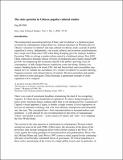| dc.contributor.author | Wang, Jing | |
| dc.date.accessioned | 2017-07-24T18:16:56Z | |
| dc.date.available | 2017-07-24T18:16:56Z | |
| dc.date.issued | 2001-12 | |
| dc.identifier.issn | 1464-9373 | |
| dc.identifier.issn | 1469-8447 | |
| dc.identifier.uri | http://hdl.handle.net/1721.1/110822 | |
| dc.description.abstract | The metonymical association between 'China’ and 'revolution' is a rhetorical game savoured by contemporary China observers. Ironical references in Western press to Chinese 'consumer revolution7 and 'pop cultural revolution, made a parade of global capitalism's victory. Indisputably, vast social, cultural, and economic transformations have swept over China since 1992 when Deng Xiaoping gave his strategic Southern Excursion Talks to salvage a market reform mired in a bottleneck phase. Post-1992 China witnessed a dramatic release of forces of production and a steady annual GDP growth. Accompanying this economic takeoff is the public's growing craze for
consumption. A fully fledged buyers' market has come into being. Chinese consumers, budding desires for music CDs, fast and frozen food, and convertibles may indeed serve to validate the ascendance of a 'counter-revolution' to socialist ideology. Tugging economic and cultural indexes in tandem, Western journalists and pundits have shown us time and again: China illustrates a paramount example of crony capitalism's new conquest. | en_US |
| dc.language.iso | en_US | |
| dc.publisher | Taylor & Francis | en_US |
| dc.relation.isversionof | http://dx.doi.org/10.1080/14649370120039443 | en_US |
| dc.rights | Article is made available in accordance with the publisher's policy and may be subject to US copyright law. Please refer to the publisher's site for terms of use. | en_US |
| dc.source | Prof. Wang via Mark Szarko | en_US |
| dc.title | The state question in Chinese popular cultural studies | en_US |
| dc.type | Article | en_US |
| dc.identifier.citation | Wang, Jing. “The State Question in Chinese Popular Cultural Studies.” Inter-Asia Cultural Studies 2.1 (2001): 35–52. | en_US |
| dc.contributor.department | Massachusetts Institute of Technology. Global Languages | en_US |
| dc.contributor.approver | Wang, Jing, 1950- | en_US |
| dc.contributor.mitauthor | Wang, Jing, 1950- | |
| dc.relation.journal | Inter-Asia Cultural Studies | en_US |
| dc.eprint.version | Author's final manuscript | en_US |
| dc.type.uri | http://purl.org/eprint/type/JournalArticle | en_US |
| eprint.status | http://purl.org/eprint/status/PeerReviewed | en_US |
| dspace.orderedauthors | Wang, Jing | en_US |
| dspace.embargo.terms | N | en_US |
| dc.identifier.orcid | https://orcid.org/0000-0002-8497-7673 | |
| dspace.mitauthor.error | true | |
| mit.license | PUBLISHER_POLICY | en_US |
| mit.metadata.status | Complete | |
